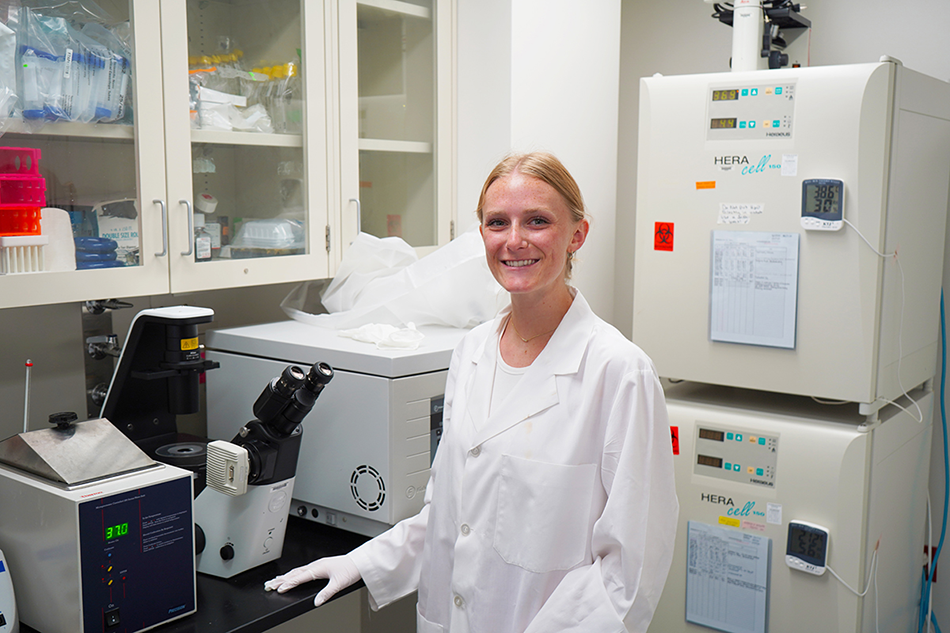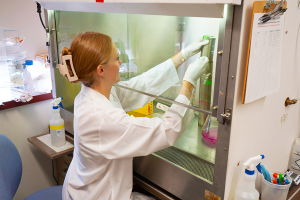
On her journey to becoming a doctor, Ashley Monks has made sure to take in a variety of experiential learning opportunities as a student at the University of Missouri. Each experience has allowed Monks to grow – both personally and professionally.
One of her most in-depth hands-on learning experiences has been in the laboratory of Laura Schulz, an associate professor in the School of Medicine. Monks has conducted research in that lab for more than a year and will continue working on a couple of unique projects after being named a Cherng Summer Scholar.
“I knew I wanted to stay at Mizzou and do research this summer,” said Monks, a biological sciences major who will be a senior this fall. “Dr. Schulz mentioned a few options, and the Cherng Summer Scholar program seemed like the best fit for me. I had never been through an application process of that nature before, so it was a great learning experience overall. My entire lab was so supportive, and we were all really excited when I found out I received the scholarship.”
A full-time, nine-week summer research or creative scholarship program for Honors College students, the Cherng Summer Scholars program is supported by a gift from Peggy and Andrew Cherng and the Panda Charitable Foundation. Recipients receive a $7,000 award and access to a $1,000 project expense account.
The scholarship will allow Monks, who is from Kansas City, Missouri, to continue a project she has been working on since January 2022, as well as begin her own research study. Both projects are focused on the role of the placenta in gestational diabetes. A type of diabetes that can develop during pregnancy, gestational diabetes affects 2 to 10 percent of pregnancies in the United States every year.
“I didn’t know much about this disease when I started, but I’ve developed a passion for learning more,” Monks said. “It’s a complicated disease, too, and one that I’m glad is being studied.”
Monks was paired with Kathryn Storey, a graduate student in biological sciences, when she joined the Schulz lab. The two have continued to work together since then and part of the research Monks is doing this summer is dedicated to that project.
Monks said that in gestational diabetes it is hypothesized there is miscommunication between the placenta and pancreas when it comes to adapting the body for the demands of pregnancy. When individuals are pregnant, a placenta develops, which connects the baby and mother, to supply the baby with nutrients and oxygen, plus remove waste.

“The placenta also secretes hormones, or tiny messages, that signal to the pancreas that it needs to adapt and provide more of the hormone insulin,” Monks said. “Glucose is a main nutrient involved in fetal development, so the maternal system will start to utilize more fats versus glucose for energy during pregnancy to allow the fetus maximum glucose supply. This metabolic design requires insulin in the maternal system so the mother can maintain proper glucose homeostasis. When that communication doesn’t work well, the individual can develop gestational diabetes.
“In our study, we are hypothesizing the placenta is not properly secreting hormones for adequate pancreas adaptation to pregnancy. Basically, we think the communication or messaging system between the two organs is disrupted.”
In addition to this work, Monks is also developing her own hypothesis on the communication between the placenta and the pancreas. She is diving in deeper on how directly or indirectly the two are communicating.
“The signaling pathways are extremely complicated,” Monks said. “The placenta usually secretes a hormone called TRH which goes to the brain. The brain then releases prolactin that signals to the pancreas to release more insulin. I’m studying to see if the direct (prolactin), indirect (TRH) or both communication systems are interrupted in gestational diabetes.”
Monks said she is hoping that she can play even a small role in better understanding gestational diabetes. She added that the Cherng Summer Scholar program is playing a big part in allowing her to explore those questions.
“Who knows what will happen, but I’m hoping to provide a small piece to a very complex puzzle,” Monks said. “With all of us contributing a bit, hopefully one day we will be able to have a better understanding of this disease.
“I’m really grateful for the Cherng Summer Scholars program, too. To do research, you have to have funding. I could only afford to work a few hours a week in my lab, which wasn’t equal to the amount of work that needed to be done. I’m so thankful for these additional resources.”
While Monks said she doesn’t plan to pursue research beyond her undergraduate degree, she is thankful for the opportunities to be in the lab, as it has aided her in her pursuit of becoming a medical professional.
“I’ve learned so much about navigating the scientific world,” Monks said. “I’m better at reading scientific papers, thinking critically and applying that knowledge to my hands-on experiences. It’s truly insane when you think about the amount of research that is happening on this campus, and it’s exciting to know that I am part of that.”
Monks is still focused on becoming a doctor in the future. Her interest in science and healthcare developed as a high school student, especially after she participated in the Northland CAPS program. The program connects high school students with a variety of professions.
“I’ve always had an interest in biology,” Monks said. “When it came time to dissect frogs in science class, for example, I loved it while my friends hated it. My passion for working in a hospital setting really began once I got involved in Northland CAPS. It’s such a great program, and I’m thankful that it provided me with such unique opportunities. I wouldn’t be where I am today without those experiences.
“Mizzou has prepared me so well for a career in medicine, and my time conducting research has played a key role in that development. My hours in the lab are definitely going to provide me with extra tools to help me as a doctor.”